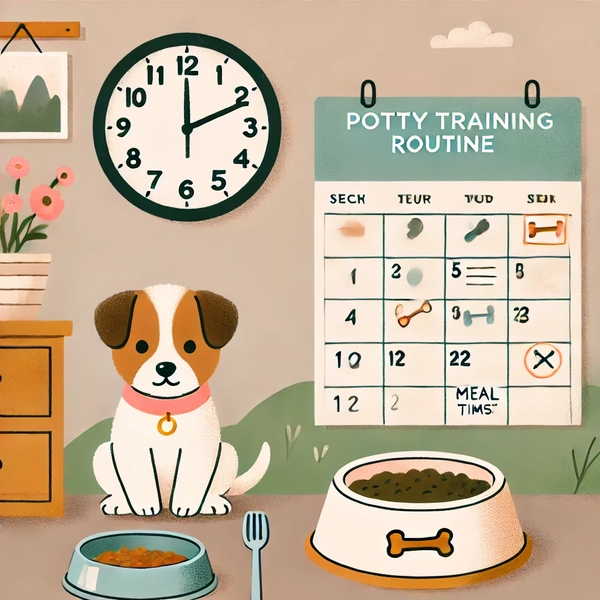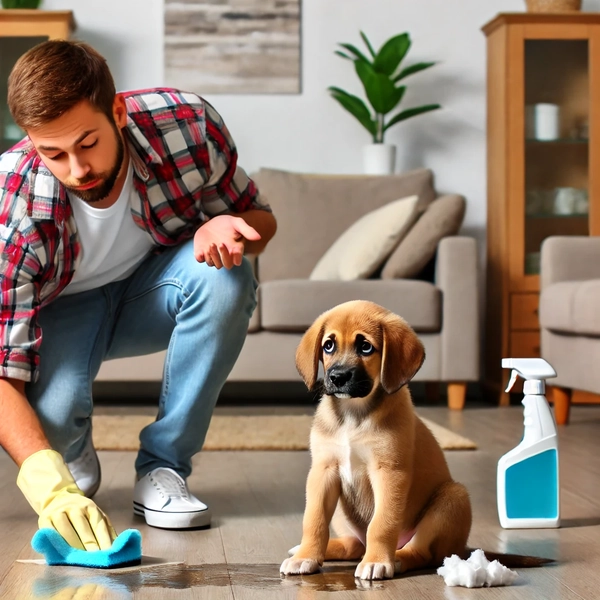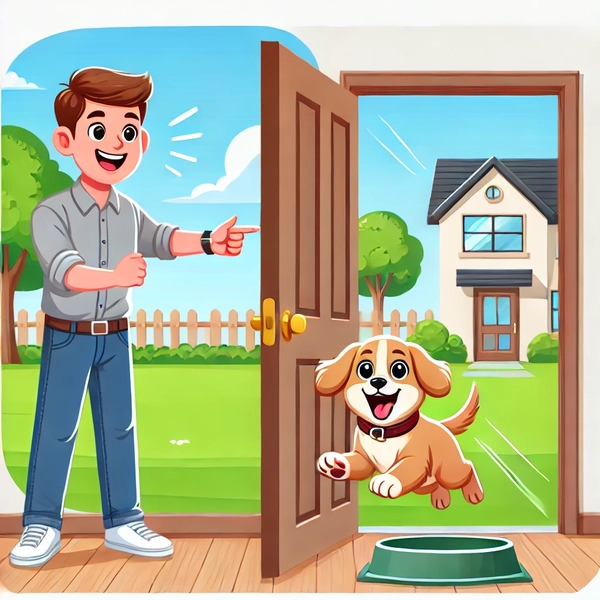How long does it take to house train a puppy? – Whenever a pet puppy is taken into a new household, housebreaking the dog is probably the most difficult of all corrections. The most pressing concern is how long it takes to housebreak a puppy. Such questions have found far-reaching answers within practical experience; however, it is often done earlier than you may believe with the right measures and patience.
What is House Training?
House training, usually known as potty training, aims to teach puppies where it is acceptable to relieve themselves. It doesn’t matter if you’re training them to do their business outdoors or on puppy pads; the goal is to teach them that such activity is necessary, but there is a right time and place to do it.
How Long does it Take on Average?
Most puppies take, on average, 4 to 6 months to house train. However, this may also depend on the age, breed, or temperament of the particular puppy. Some puppies may do it rather quickly, while others may take longer. Don’t worry—every dog has its time!
What Affects Speed of Learning in Your Puppy?
There are a few determinants that will decide how quickly training your puppy on housebreaking will take:
- Age: older puppies might be trained on housebreaking in less time than younger ones.
- Breeds: Some breeds are fast learners in a new household, while others may take a long time.
- Routine: Adhering to the prescribed pattern will enable your puppy to adjust quickly.
- Your Attitude: Puppies are emotional beings and will learn to read yours. Keep a smile on your face and count to 10.
- Temperament: Each puppy has a different personality. Some are very supple, but others can be quite rigid.
The Role of Age in House Training
In the aspect of house training, Age is a consideration. Puppies less than three months of age cannot be blamed for the lack of precise bladder control. They are still trying to figure out how to keep it in. By sixteen weeks, however, puppies start to gain better control over their bladder and can hold it for longer.
Creating a Potty Training Routine

Routines are of great importance whenever one wants to accomplish any house training. A puppy will perform better knowing appropriate times and places to relieve itself. Below is a basic outline to adhere to:
table here
Comparative Advantage of Having a Routine
Puppies are more comfortable when they are aware of activities that need to be carried out. This also helps reduce the chances of a mess being created in the house. Eventually, this makes sense to them, and they follow this schedule automatically.
Incentives for Proper Behavior
When it comes to house training, positive reinforcement is the only way to go. Whenever your puppy goes to the correct spot, let them know that it was a good thing. Give treats, praise, and a happy voice to them. This makes them think that leaving the house is a good experience.
Avoiding Punishment
No matter how much mess your puppy creates, it is wrong to punish it in any way. Little puppies don’t understand, so scolding a puppy may disorient it and even frighten it. Simply go ahead and clean the area while disregarding the incident. This aids in expediting their learning processes.
Applying Crate Training for Enhanced Potty Efforts
Many dog owners have found house training with the use of a crate advantageous. Puppies do not relieve themselves in areas they consider sleeping quarters, so a crate would encourage them to do so.
Ensure the crate is of the right proportions: one where the puppy can comfortably turn around but cannot go to the other end of the crate to the toilet in the opposite corner.
Look for Behavior That Indicates Your Puppy Needs to Defecate
Or, instead, take note of all of your puppy’s actions. This is a list of some typical indicators that they are about to ask to go outside:
- Searching for something on the ground: A puppy is likely looking for a place to pee if it sniffs the floor.
- Moving in circles: This behavior is typical for puppies moments before relieving themselves.
- Making sounds such as whining or barking: Could these creatures be trying to communicate with you?
- Going to the entryway: If they start wobbling in that area, it is probably due to a pending episode of relief.
Preventing Accidents Inside
To eliminate any risks of a mess indoors, it is best to keep an eye on your puppy at all times and intervene any time you see signs. Should your dog display any of the above signs, take it outdoors without delay.
How Long Can Puppies Withstand Without Waking Up?
Every puppy has a small bladder which spits most of the time. A safe estimate will be that a puppy can last 1 hour every month in age. For instance, if the puppy is three months, they can last for abo hours before emptying the bladder.
Daytime vs. Nighttime Bladder Control
While sleeping during the day, puppies tend to use their bladders a bit more at night since they are sleeping. However, it is advisable to take them out first thing as night comes to an end.
Common Challenges in House Training

No matter how well your puppy is integrated into a new routine, there could be an exception. Worry not; such issues arise during training and are known as regressions. Here’s what to do with some difficulties:
Regression
At times, puppies seem to regress in their house training, as if they have reversed their progress. This is normal and can also happen due to an influx of visitors, changes in schedules, or any other activities or stress factors. When it happens, go back to basic lessons—follow the timetable and praise the dog at every step of the training.
Excitement Peeing
Some puppies tend to urinate when they are happy or anxious. This behavior is often outgrown, but try to greet your fur baby without any excitement to lessen the occurrence.
Submissive Peeing
This is different because it happens in puppies who are scared or subservient when urinating —this is referred to because the dog cannot control its bladder. Usually, this happens when they are introduced to different individuals or strange dogs. The best way to deal with submissive peeing is to avoid reacting to it and to slowly assist the puppy in gaining confidence.
Marking
Some puppies that are not neutered will begin to mark their territory by spraying inside the house. If this behavior occurs in your new pet, you should consult a veterinary specialist about possible neutering, which often prevents this behavior.
Speeding Up the House Training Process

Want to speed things up? Here are some tips to help you:
- Same Old: And keep doing the same thing! For example, use the exact phrase “Go potty!” every time.
- Watch Like a Hawk: So, watch your pup. Don’t let them run wild if you can’t keep your eyes on them. Easy peasy.
- Ding! Potty Time: Use your cell phone. Also, set up toilet break schedules—there are many of them!
- Clean It Right: Buy a special detergent. Anywhere where it smells – no more! So your pup doesn’t do that again. Duh.
Please keep a record of your puppy’s daily routine. Also, make notes about when your puppy eats, urinates, or defecates. This will aid you in understanding their innate rhythm.
When Will Your Puppy Be Fully Trained?
Most puppies are completely housebroken at the age of around six months. You will know that your dog has been trained when:
- They can withhold it for several hours.
- They informed you when it was necessary to go outside.
- They remain dry during nighttime.
- Even when the owner is not paying close attention, the dog can be left alone in the house without risk.
Handling Setbacks
As much as we wish for it, even the most trained puppies can still occasionally exhibit some ‘accidents.’ Worry does not happen. Simply return to the fundamentals and increase the frequency of potty breaks and squats with praise.
Weather and House Training
The weather can present some challenges in certain instances. For example, puppies may be unwilling to go out in the rain or the cold. However, it is very important that the routine is still adhered to. Consider carrying them out on a leash or perhaps allowing them to access a shielded potty.
It is challenging to train an indoor puppy baby to relieve herself in a house; it requires time, energy and consistency. Usually, it takes about four to six months, but each puppy’s pacing will vary.
Oops, accidents will happen—no need to fret. Oops, Don’t give up! You and your puppy are just starting to be best buddies. Housebreaking your puppies is just the beginning of many enjoyable moments together!